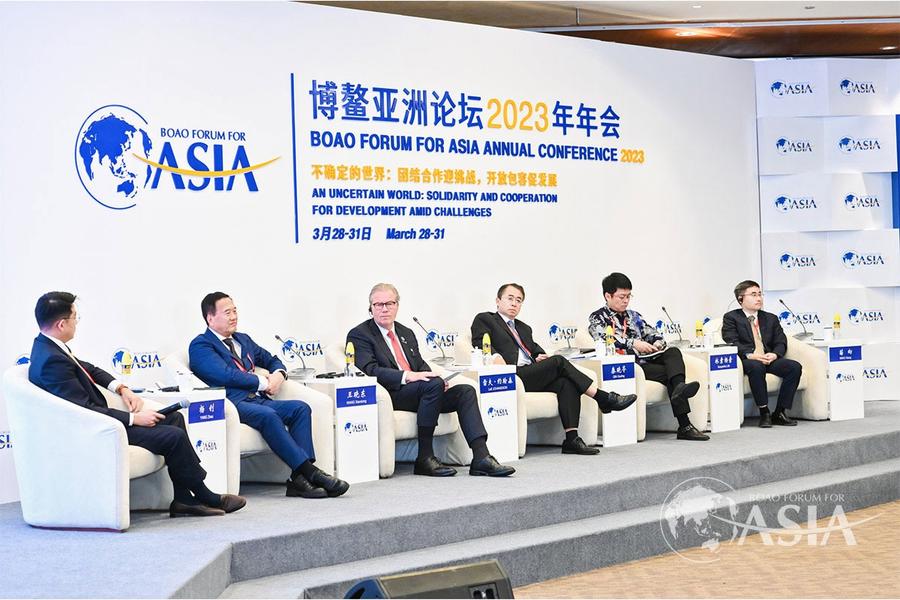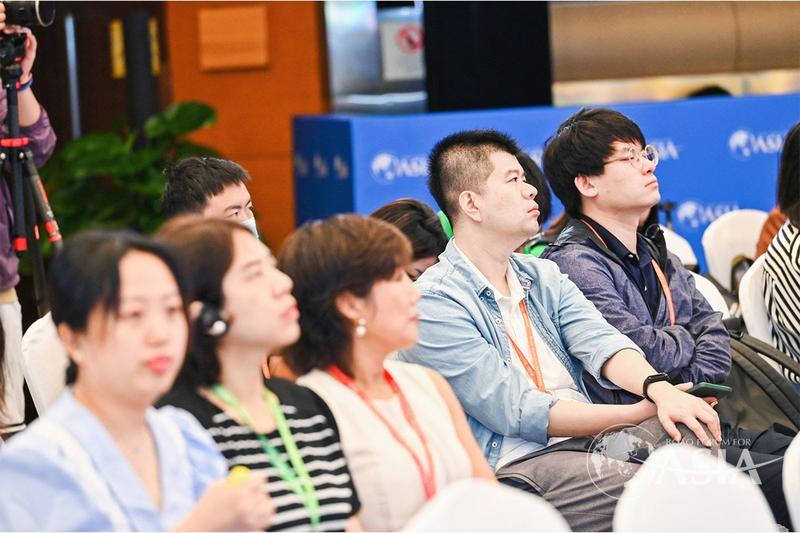 Panelists discuss on the topic Biopharmaceutical Innovation and the New Path of International Cooperation at the Boao Forum for Asia Annual Conference 2023 in Hainan province, on March 31. (PROVIDED TO CHINA DAILY)
Panelists discuss on the topic Biopharmaceutical Innovation and the New Path of International Cooperation at the Boao Forum for Asia Annual Conference 2023 in Hainan province, on March 31. (PROVIDED TO CHINA DAILY)
Experts say COVID-19 pandemic proves industry’s resilience vital to deal with future crises, improve wellbeing
A higher level of international cooperation is needed to enhance the resilience of the biopharmaceutical industry to ensure better preparation against future health emergencies and the wellbeing of humanity, according to experts and business leaders.
The outlook came during a panel discussion on “Biopharmaceutical Innovation and the New Path of International Cooperation” on the last day of the Boao Forum for Asia Annual Conference 2023, held in South China’s Hainan province from March 28 to 31.
Basic science has no nationality.... The more we can cooperate, the more we can learn from each other and the better we will be able to make good medicines.
Leif Johansson,
chairman of biopharmaceutical company AstraZeneca
“By promoting development through international cooperation, we can enhance the resilience of the industry and provide solid protection for (people’s) health,” said Qin Xiaoling, director-general of the Department of Science, Technology and International Cooperation of the National Medical Products Administration of China.
Building resilience, Qin said, is not only about the safe use of drugs but also the high-quality development of the pharmaceutical industry, which requires a balanced approach to safety, health, and development.
ALSO READ: Pharmaceutical companies grab Chinese market opportunities
Qin said this will require proper policies, technological support, and international cooperation.
“Basic science has no nationality,” said Leif Johansson, chairman of biopharmaceutical company AstraZeneca. “The more we can cooperate, the more we can learn from each other and the better we will be able to make good medicines.”
The COVID-19 pandemic has highlighted the importance of resilience, Johansson said, and it should be dealt with at the individual, healthcare system, and societal levels.
For example, besides storage requirements, Johansson said the successful rollout of COVID-19 vaccines globally is dependent on the efficiency of each country’s healthcare system.
In recent years, one of the biggest differences in the industry is that people have now realized that China has risen to be a major global player, said Wang Xiaodong, a member of the United States National Academy of Science and a foreign member of the Chinese Academy of Sciences.
During the pandemic, Wang said there have been tens of Chinese companies working on new vaccine development, from recombinant protein to mRNA and all sorts.
On March 22, China approved its first COVID-19 vaccine based on mRNA technology to be used within the country. The vaccine was developed by domestic drug manufacturer CSPC Pharmaceutical Group.
READ MORE: China goes all out to increase output of medical supplies
Wang said he is confident that Chinese companies will be able to make better medicines than those currently available, and when that happens, it will have a global impact as it will help lower the whole cost structure of the industry and make medicines much more affordable.
As Indonesia aims to become the world’s fifth largest economy by 2045, Lim Soeyantho, deputy president director of Indonesian pharmaceutical company Combiphar, said health is important to boosting both productivity and GDP.
China and Indonesia issued a joint statement in November during the G20 Leaders’ Summit in which the two sides pledged to further cooperate in health, including supporting the Southeast Asian country to become a regional vaccine hub.
 Members of the audience listen during the panel discussion titled Biopharmaceutical Innovation and the New Path of International Cooperation at the Boao Forum for Asia Annual Conference 2023 in Hainan province, on March31. (PROVIDED TO CHINA DAILY)
Members of the audience listen during the panel discussion titled Biopharmaceutical Innovation and the New Path of International Cooperation at the Boao Forum for Asia Annual Conference 2023 in Hainan province, on March31. (PROVIDED TO CHINA DAILY)
Lim said his company is also working to evaluate Chinese vaccines that can improve preventive healthcare in Indonesia, adding that he hopes such production can support other countries in Southeast Asia.
During the Boao forum, Combiphar signed a memorandum of understanding with Shenzhen Kangtai Biological Products Co and AstraZeneca. This aims to promote the localized production and commercialization of the Shenzhen company’s COVID-19 vaccine and others in Indonesia.
The cooperation of regulatory authorities from different countries is important for the industry’s resilience, said Miao Xiang, president of Shenzhen Kangtai Biological Products Co.
ALSO READ: Guangdong excels in the pharmaceutical industry
“Thanks to the global cooperation in regulation, we were able to export our vaccines to Indonesia and make contributions to its anti-pandemic efforts,” said Miao, whose company supplied adenovirus COVID vaccines to the archipelago.
“Only with enhanced resilience of the pharmaceutical industry, can the ordinary people enjoy more freedom in their life,” said Miao, stressing the industry’s role in fighting the pandemic.
China is working closely with the World Health Organization in terms of vaccine regulation and has passed an assessment by the WHO on its vaccine regulatory system, Qin from the National Medical Products Administration of China noted, adding this provides a good foundation for Chinese vaccines to go abroad.
Qin said China will continue its health cooperation with the international community in the post-pandemic era.
“All of these efforts are aimed at making sure good medical products, wherever they are developed, can be rolled out quickly for global use,” he said.


